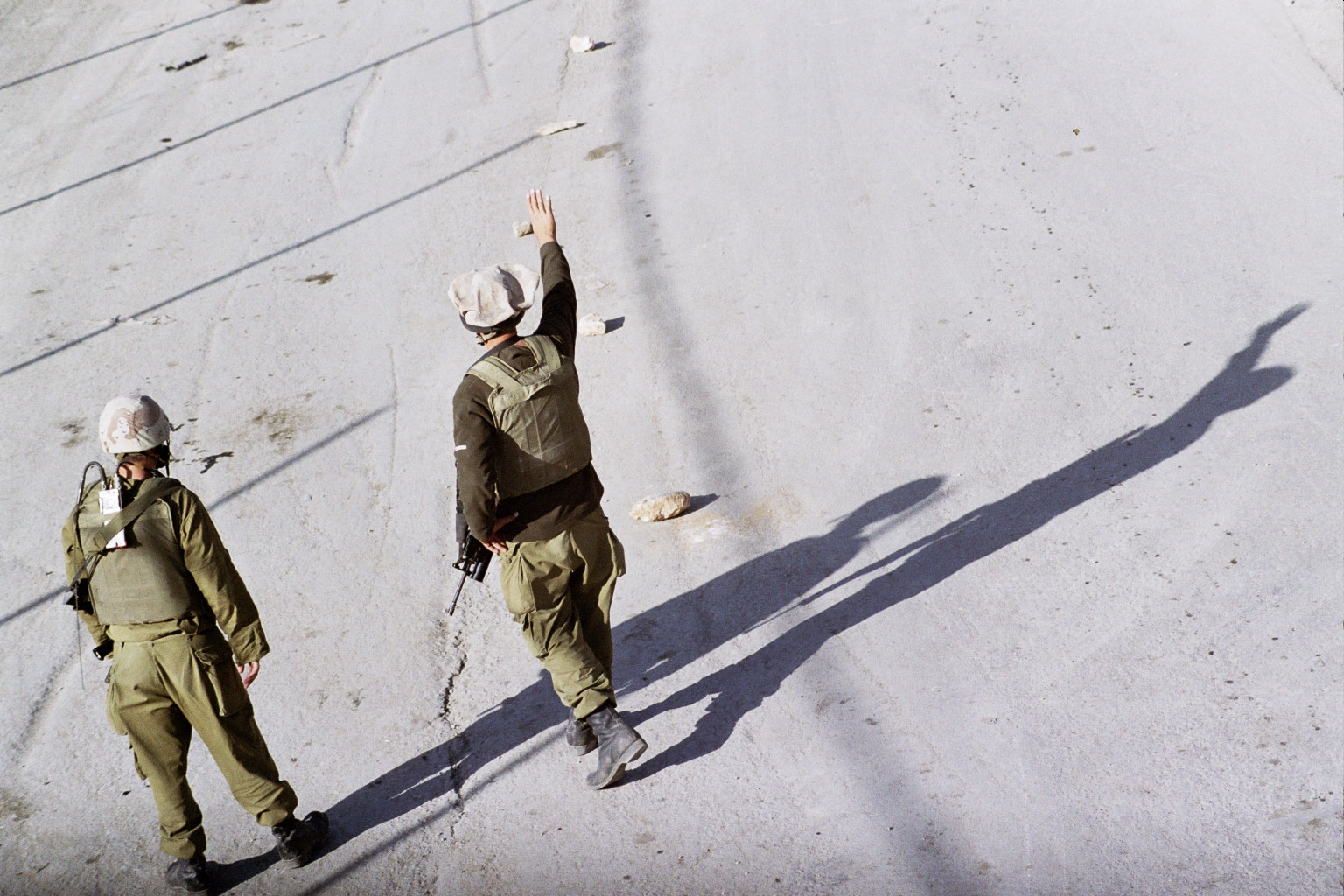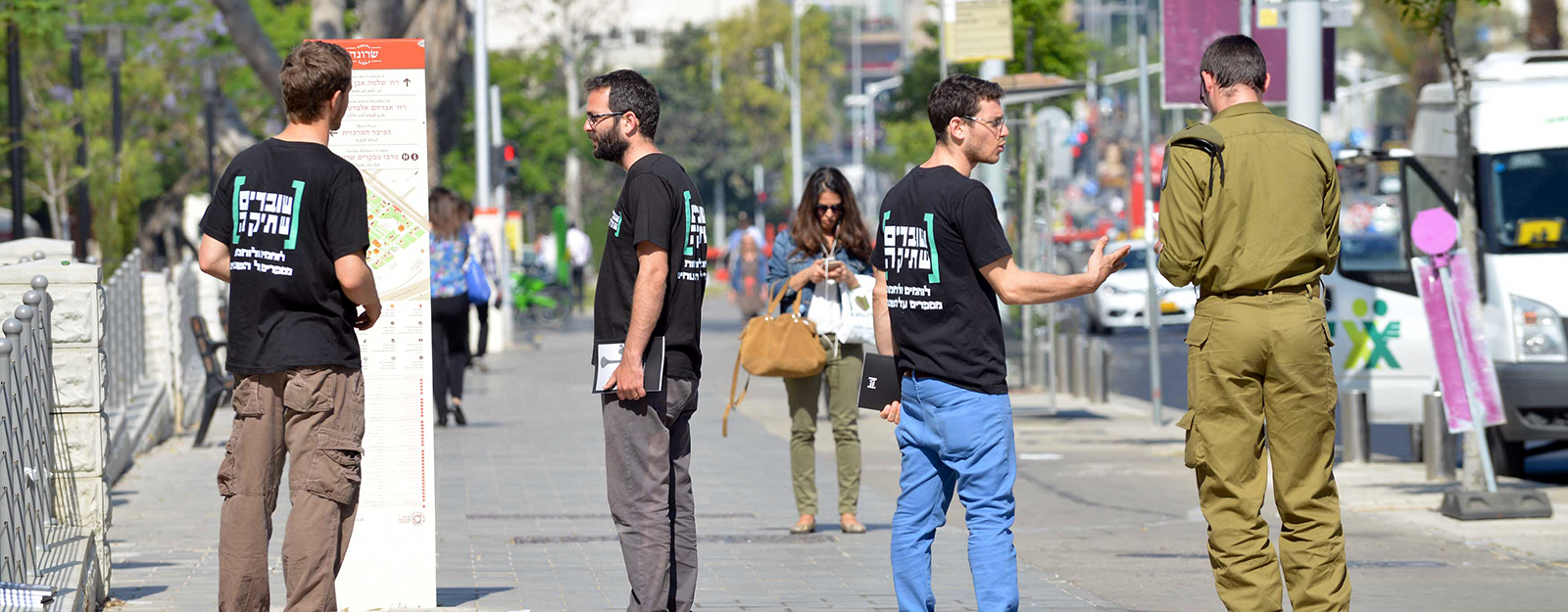Where were you in the West Bank? In Azun (Palestinian village), in Shilo, Eli (Israeli settlements). The Tul Karm area in 2000-2001. During the intifada.
You did reserve duty before that. How was it then? Yes, in July-August, and the intifada broke out in the beginning of October. We understood that we were going to war, there was a very tense atmosphere.
How did you prepare for it? We had training in Ze'elim. Mofaz was the chief of staff, he came to speak with us. They built a fake Arab village in Ze'elim to train the soldiers. They understood there was going to be a strong clash with the Palestinians and a lot of missions on the front line were mostly securing settlers, in crazy outposts near Eli. I don’t remember special incidents.
Did you interact with the settlers? I myself didn’t. Some of the company did, because they had to separate between Arabs and settlers who were fighting. At that time, I was more a second operations sergeant in the operations room.
You don’t remember operations from that period or unusual incidents? Or the routine of reserve duty in the West Bank or Gaza, which is complicated enough as it is. The whole situation is complex. The more reserve duty I did, the less I agreed with what we were doing. For example, the fact that there’s a company commander from [the settlement of] Atzmona, who is religious. His personal outlook can’t be separated from his decision-making in the field as a commander. It’s an extreme right-wing approach.
Was it apparent? I noticed it immediately. It was a view of individuals, of Palestinians, as not really people, as half human. They can put up with anything and we are the lords of the land who have come to rule and make order. If I were in regular army service today, I would have a real problem. I don’t know what I would do. You can’t change the whole nation, but the army has to set clear procedures. From 1990 until the middle of the 2000’s, I did reserve duty and saw the army change, adopt more extreme positions, more and more religious commanders, very right-wing, much more extreme in their views. I believe that part of it is also a response to the general deterioration of the whole system. Things become normative and because of that, when I hear about things that happened in Operation Cast Lead, it’s easier for me to believe that they really happened. As someone who’s done a lot of years in reserve duty, I’ve seen the entire military system deteriorate, not separating ideology from the decision-making process in the field. If a soldier or officer is from a right-wing or very religious background, why should they make a distinction the moment they a Palestinian in their sights? He sees them as terrorists, not as people.
Did you see that in practice in reserve duty? Of course. Also, the fact that 20 soldiers stand and shoot into the dark, and no one asks himself whether an innocent person may be passing by. The ease with which they shoot at children, taking a safe distance and firing. Why? Can’t I watch them until they reach the fence and make them go away once they get to the fence? Very easy on the trigger. There was also a feeling that things were happening out of frustration. They took down four soldiers, infiltrated the post (the witness previously related how gunmen infiltrated a post in Gaza and killed 4 soldiers), so let’s vent our frustration in a different way. In my opinion, all of Operation Cast Lead was just that, no one knew the objective. We had one case, I think it was in 2001, we were doing navigation training with the jeeps near Shoket Junction and we stopped for a lunch break. A young boy came along, a shepherd with his sheep. One of the soldiers in the company, a detestable person, decided that he wanted to joke around. He went over to to the flock, took a sheep and started walking in the direction of the jeep, as if he was going to take it. The boy, 12-13 years old, became hysterical because he was sure they were going to take his sheep. He ran after the soldier, crying. The soldier ignored him and kept on going, as if he was about to drive off. The guys were laughing and I went nuts. I know Arabic better than other soldiers, I studied it at university, I understood what the kid was saying. He was pleading, give me back the sheep, it’s mine. I guess he was also afraid of his father. I confronted the soldier and started yelling at him to give back the sheep. In the end, he gave back the sheep.









 testimonies
testimonies  media & content
media & content 










 He sees them as terrorists, not as people.
He sees them as terrorists, not as people. 

 terms of use & privacy policy
terms of use & privacy policy